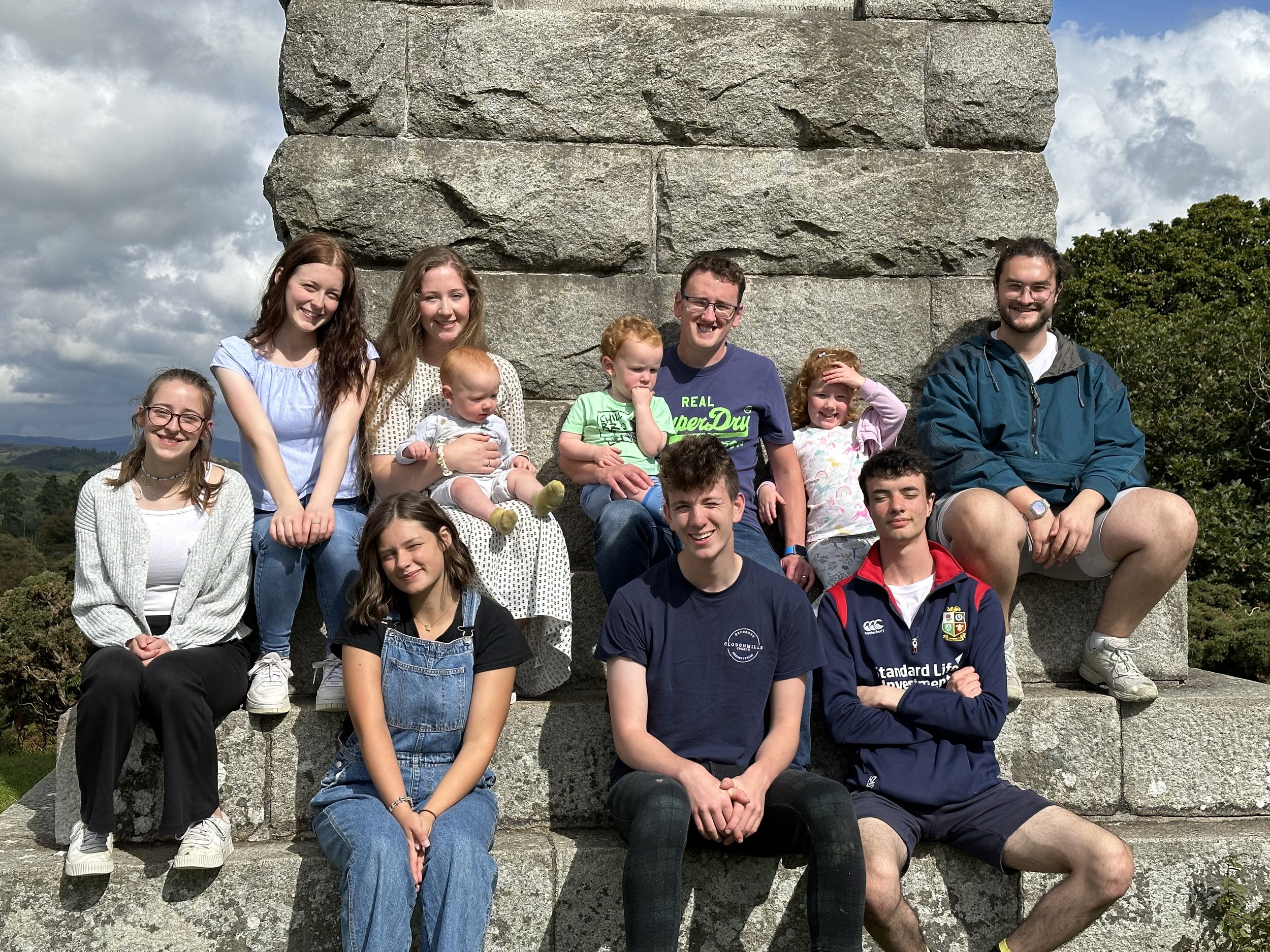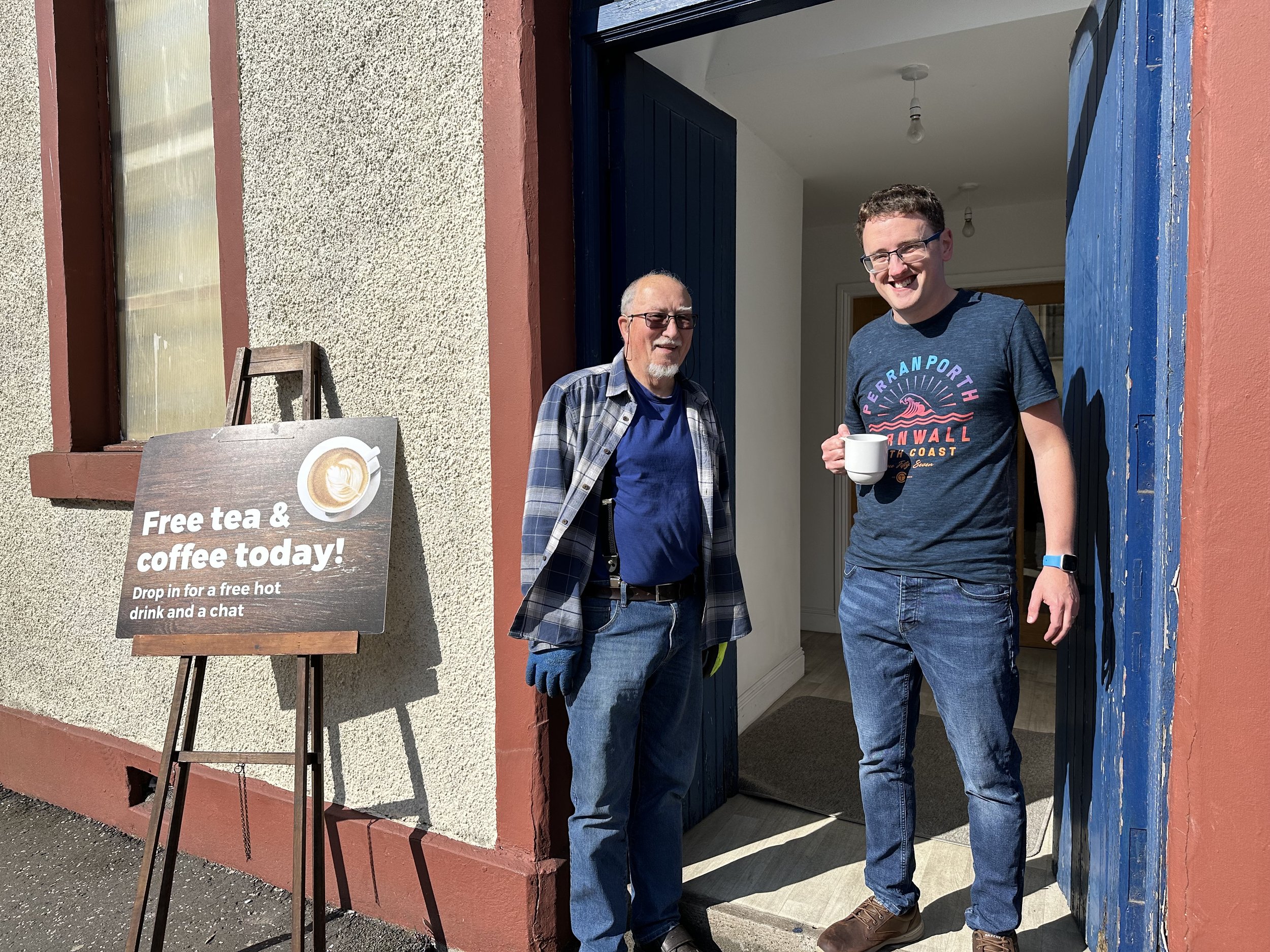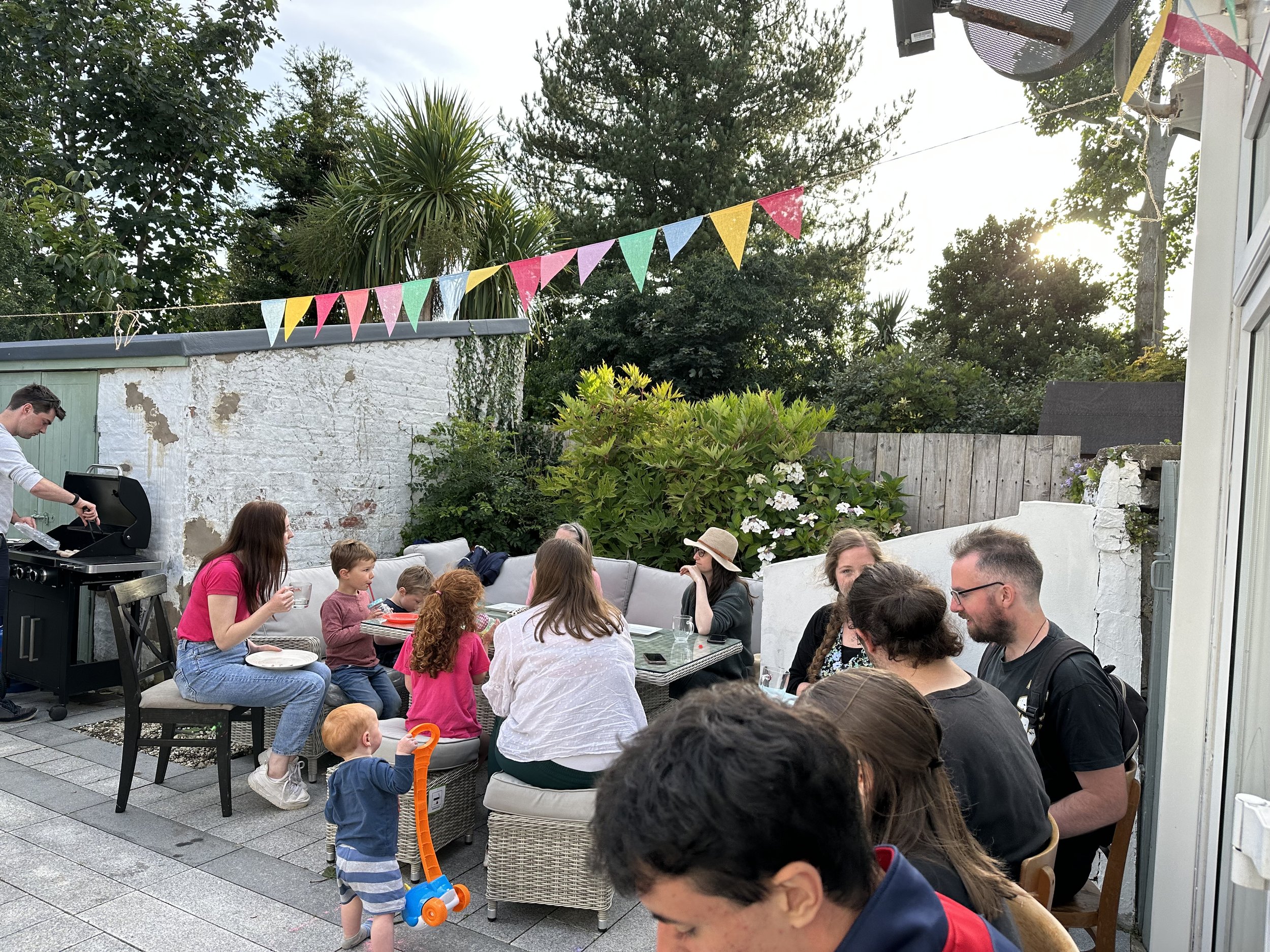At the end of August we said goodbye to Amy who has moved back to Northern Ireland to take up a job in her hometown. Amy has played a big role in our congregation during the past seven years, particularly as a Sabbath School teacher. We are thankful for her time in Stranraer and will miss her a lot!
GO Team 2023
During the last week of August we had a go team (short term mission team) with us. The team members were Ruth, Hannah, Rosaleen, Hamish, Trinity, Campbell and Matteo.
Some of the team’s activities are summarised below:
Psalm singing in the town centre on the Lord’s Day afternoon, which led to a new contact being made.
Almost 5,000 leaflets advertising our mission services were distributed in Stranraer, Castle Kennedy and Sandhead.
On the Wednesday morning, some of the team did practical work at the church, while others helped run a drop-in. We were very encouraged to have 9 people come in over the two hours.
The team also helped to set up for a congregational BBQ at the manse on the Wednesday evening, to which the congregation were encouraged to invite family and friends.
On the Thursday, after a Covenanter tour to Anwoth, the team ran a One Day Bible Club. We had five church children in attendance, as well as two from outside the church.
On Friday, the remaining team members (some left on the Thursday) did some cleaning up at Stair Park (home of Stranraer FC), which has resulted in some very favourable comments being made to Stephen (who serves as club chaplain) at Stranraer’s home match the following Saturday.
All in all it was a really encouraging week, for which we give thanks to God.
Retirement: The New Afterlife?
The fastest growing metro area in the United States is called The Villages. It’s a retirement community that takes up eighty square miles of central Florida and is home to one hundred and forty thousand people. It contains nine state-of-the-art hospitals, a dozen sprawling shopping centres, over one hundred bars and restaurants, and more than fifty golf courses.
Retirement is certainly big business. The US has a total GDP of twenty-three trillion dollars, but the assets of all American pension funds are nearly fifty percent larger. In the words of journalist Sam Kriss, ‘mass consumer pensions have turned our entire adulthood into a preamble to old age. You work for three, four, five decades—all so you can enjoy those few, brief, useless years between retirement and death’. He goes as far as to say that ‘the entire global economy is now a machine for producing satisfied retirees’.
The Villages attempts to sell people the thing they have been working for all their lives – perfect leisure before they die. Sounds ideal? Kriss visited the Villages and says that it’s the worst place he’s ever been to.
So what’s not to like? According to Kriss, the message of The Villages is that ‘the true purpose of human life is to have fun, to drink and play golf, and you can only really experience the true purpose of human life once you’ve retired’.
It used to be that people believed in an afterlife. The Christian hope, for example, is that ‘the sufferings of this present time are not worth comparing with the glory that is to be revealed to us’ (Romans 8:18). But take away the hope of a glorious future beyond this life and we have to try and find it here and now.
The idea of ending our days in a retirement community in Florida might be beyond most of us. But increasingly, people are living for retirement. And yet that hope often disappoints. Some don’t make it that long. Nor is it uncommon to hear of someone retire and then almost immediately be hit with a terminal diagnosis just as their long-planned future opened up before them. Others soon become too ill to enjoy it.
Indeed, the precariousness of life in The Villages is the elephant in the room. There are no cemeteries. The ambulances and hearses are unmarked. ‘Nobody talks about the fact that every few weeks, a vaguely familiar face vanishes from the pickleball court’.
Retirement is a very fragile basket to put all our eggs in. And even if someone does hold onto their health, what if the thing they’ve been putting their hope in for so long lets them down? What if the promise of inactivity turns out to be a nightmare?
For many others, it’s not retirement they’re living for, but the weekend. And again, if there’s no afterlife, it makes a certain amount of sense. Indeed, the Apostle Paul could say, ‘If the dead are not raised, let us eat and drink for tomorrow we die’ (1 Corinthians 15:32). If this life is all we have, then any enjoyment we are to have must be found here and now.
So does that mean that those who don’t believe in an afterlife will be happier in this world than those who do? Not necessarily – because that’s a lot of weight to put on the things of this world. Hoping that a relationship will make us happy is a lot of weight to put on another person. It’s the same with our weekends, a holiday or retirement itself.
The Bible doesn’t teach a kind of asceticism in which the good things of this life are to be shunned. Rather, it’s only when God is put in his proper place that the good things of this life can be fully enjoyed. Only when we’re not looking to them to bring us ultimate happiness – when we’re not looking to them to do what only God can do – can we properly enjoy them.
The big objection of course is that believing in an afterlife is a pipe dream. But listen to the words of converted atheist C. S. Lewis: ‘If I find in myself a desire which no experience in this world can satisfy, the most probable explanation is that I was made for another world’.
Lewis said that while there are all sorts of things in this world that offer to give you what really want, ‘they never quite keep their promise’. Earthly pleasures are simply signposts to something greater.
Published in the Stranraer & Wigtownshire Free Press, 28th September 2023
Anxiety, Shame, Hope, Change
The audio (along with some video) from our recent series of special meetings is now available:
The Anxiety Epidemic
It’s probably fair to say that we find ourselves in the middle of an anxiety epidemic at the moment. Earlier this month the Wall Street Journal had an article entitled ‘The Booming Business of American Anxiety’. The key stat was that according to a recent survey by the National Centre for Health Statistics, 27% of respondents indicated that they had symptoms of an anxiety disorder. This was up from 8% in 2019.
Between then and now of course, we’ve had Covid, the cost of living crisis and the simmering potential of nuclear war in the background.
Yet while these things no doubt have led to an increase in anxiety, people have been talking about an anxiety epidemic long before Covid. A book entitled The Anxiety Epidemic’was published in 2018 – that’s two years before Covid. In fact, an earlier book called The Anxiety Epidemic was published in 1986. A 2008 article in the Independent was entitled: ‘The anxiety epidemic: Why are children so unhappy?’ In America, a 2012 headline in the Atlantic magazine talked about a ‘National Anxiety Epidemic’. In 2016, the Observer proclaimed: ‘Only fundamental social change can defeat the anxiety epidemic’.
So while we can certainly point to potentially-anxiety increasing events over the past few years, commentators have been talking about an anxiety epidemic for quite a while.
Anxiety itself of course is nothing new. We could go back 3,000 years to an ancient Hebrew song which warns against ‘eating the bread of anxious toil’. That song is in the Bible, and we know it today as Psalm 127. We could go back to an ancient proverb, from around the same time, which is also recorded in the Bible: ‘Anxiety in a man’s heart weighs him down, but a good word makes him glad’. We could go back 2,000 years ago to Jesus, telling people not to be anxious about tomorrow. We could go to the Apostle Paul, who says: ‘Do not be anxious about anything’ – and yet who also talks about feeling the daily pressure of his anxiety for all the churches.
I’m sure we all know what it’s like to feel anxious before a big event like an exam, a job interview and so on. That anxiety is a normal part of life. But there is also a crippling kind of anxiety which can lead to us lying awake night after night, and which in certain cases can almost stop us functioning.
It’s this second kind of anxiety that has been increasing in our society in recent years. So what is the cause?
One explanation comes from German sociology professor Hartmut Rosa, who wrote a book in 2020 entitled The Uncontrollability of the World. In it, he diagnoses one of the big problems making us anxious, and suggests a cure. His diagnosis is that we are seeking to make the world controllable. The problem, in his eyes, is that we ‘tend to encounter the world as a series of objects that we have to conquer, master or exploit’. When we encounter situations we can’t control, it leads to frustration, anger and despair. What he says we must do instead is be ‘open to that which extends beyond our control’. In other words, to accept and even embrace the fact that we aren’t in control. And then we won’t feel so anxious.
As a Christian, I think his diagnosis is so close to the truth. He’s right that we become anxious when we feel like we’re not in control. Even his cure gets us halfway there: we need to embrace the fact that we aren’t in control. But Christianity offers a better answer than saying that the world is out of control, and there’s nothing we can do about it. Rather, it tells us that while we are not in control of the world, there is a wise and loving God who is. And that’s good news!
Rather than relieving our anxiety, realising that we can’t control what happens around us will make it worse – unless we come to trust that there is a God who knows what he’s doing.
Given that anxiety seems to be everywhere today, it’s one of the topics that we’re going to be considering in a series of four special meetings we’re hosting in church, beginning this evening at 7pm. The other talks (on Friday, as well as Sunday morning and evening) will deal with Shame, Hope and Change. It would be great to see you there!
Published in the Stranraer & Wigtownshire Free Press, 31st August 2023
(The talk referred to can be listed to here)











